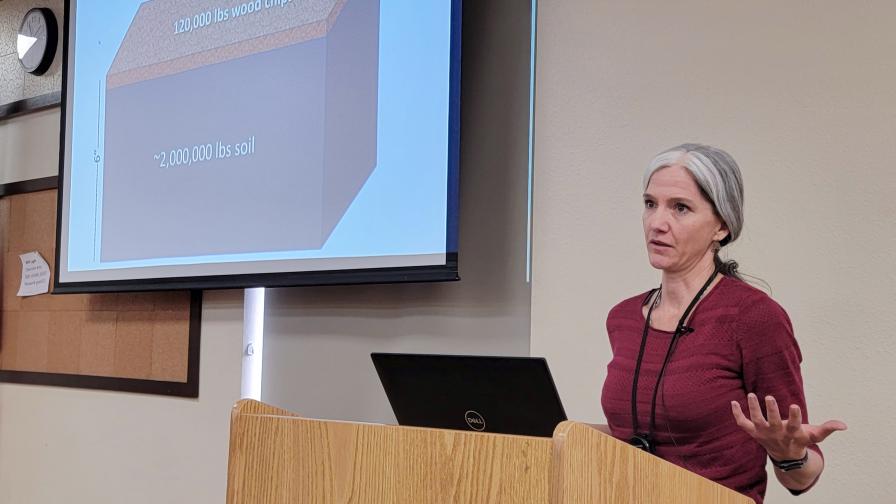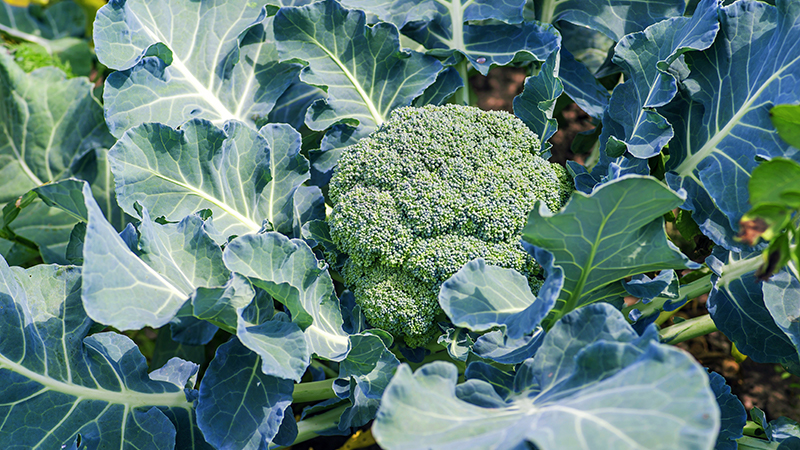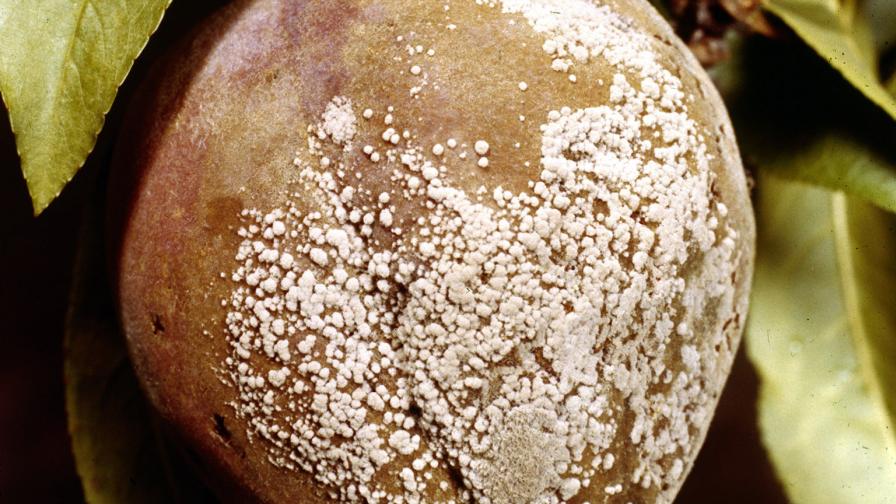California Tree Nut Growers Bat Lead Off in Climate Change Workshops

UCCE Nut Crop Advisor Mae Culumber, an American Fruit Grower columnist, was one of 10 presenters at the state’s first climate change workshop for specialty crops. She addresses the hot topic of whole orchard recycling, which sounds daunting, as it means grinding up the 60 tons per acre of woody mass found in the average almond orchard and returning it to the soil. As she notes in this slide, all that mass represents just a small percentage of the top soil.
Photo by David Eddy
To understand just how different farming is in California, consider the fact experts no longer believe the standard way of estimating chill hours — the number of hours in the winter between 32ºF and 45ºF — is all that useful in the Golden State, as “chill is just a guess,” says University of California Cooperative Extension (UCCE) Orchard Crops Advisor Phoebe Gordon.
“It was not developed for California,” Gordon told an audience in Merced, CA, in late March at the Climate Smart Agriculture for Nut Production Workshop, noting the model was developed by scientists in colder climates. “They don’t tend to get 65°F in the middle of January.”
Gordon highlighted just one of the massive challenges facing the state’s farmers at the first of up to 20 workshops over the next five years on the effects of climate change for specialty crop growers. To help California farmers adjust to uncertain weather and climate events, USDA National Institute for Food and Agriculture (NIFA) awarded $1.5 million to a team of scientists led by University of California (UC) Agriculture and Natural Resources. The project is one of six projects funded by NIFA’s $9 million investment to expand adoption of climate-smart practices.
“The Cooperative Extension system and USDA Climate Hubs have unmatched capacity to reach agricultural, Tribal and underserved communities, as well as educators and students, and our nation’s farmers directly,” says Agriculture Secretary Tom Vilsack in a statement announcing the grant recipients. “This partnership will strengthen climate research efforts and accelerate the development, adoption, and application of science-based, climate-smart practices that benefit everyone.”
NUTS ARE NO. 1
If California specialty crop growers are to benefit, they need locally relevant climate information and adaptation resources, says UCCE Specialist Tapan Pathak, who’s based at UC Merced and principal investigator for the grant. Pathak is conducting needs assessments with local growers and other stakeholders, workshops and climate-smart agriculture training, as well as involving students so tomorrow’s scientists will be
well-versed in the challenges.
The Merced climate change workshop focused on tree nuts, Pathak says, because they cover so much acreage and are so valuable to the state’s economy. At least one of the coming years’ workshops will focus specifically on grapes, while others will be centered on the crops grown in certain areas. For example, a session on berries and vegetables would be a natural for a Central Coast workshop.
“It’s impossible to have one workshop to cover multiple crops, because every crop has a different response. So how can we tailor it to different commodity groups? Our hope is to at least cover top specialty crops,” he says. “Most likely will do more nut workshops in the next three to four years, as well as fruit crops such as stone fruit.”
Each meeting will feature a wide range of experts on various ramifications of climate change. At the Merced workshop, the 10 topics included the effects of climate change on not only the crops, but pests, water management, power supply, cover cropping, and whole-orchard recycling, among others. Pathak says they have been surveying growers and conducting focus groups to find out what the workshops should address. His questions include: What challenges are they facing? What are their priorities? What do they want UCCE to address?
“We will tailor the workshops based on those needs,” he says. “For example, in starting with nut production, we have come to realize chill is a big issue,” he says.
NOT-SO-BIG CHILL
The concept of chilling hours is not only a big issue when it comes to climate change but also extraordinarily complex. For example, Gordon says UCCE Advisor Craig Kallsen theorizes that pistachio growers should think less about chill in wintertime these days but heat during winter interfering with the trees’ normal cycle. And in prunes, UCCE Advisor Franz Niederholzer says an early prune bloom, such as in mid-March, may cause serious problems.
“This could potentially be a huge risk in the future,” Gordon says. However, she notes that because the issue is so complicated, “It’s not all bad news.”
“Walnuts and juvenile pistachios are vulnerable to early frosts,” she says. “Because of climate change, we likely don’t have to worry about those.”









